#Magic System
Note
Apart from Fleki, have we ever seen one of the Canaries shit faced on alcohol or drugs ? It's said to be somewhat common among magic users, but so far I can only remember her doing it.
It's said that the ones that risk their lives many end up addicted,

We haven't seen explicitly but Flamela's squad has some that use it

186 notes
·
View notes
Text
A Retrospective on Harry Potter
Why did I like it in the first place? What about it worked? Where do I go from here?
I have decided to give up Harry Potter.
J.K. Rowling’s reputation now stinks to high heaven. At this point, she is quite indefensible. And even if that weren’t the case, she is not someone that I would want to associate with anyway. Meanwhile, the internet has not only turned against her, but against Harry Potter itself. An innocent question on Reddit, about which Hogwarts Houses the ATLA characters would be in, got downvoted to oblivion. Innumerable Tumblr threads insist that fantasy fans should get into literally anything else (suggestions include Discworld, Earthsea, The Wheel of Time, and Percy Jackson). And now that Harry Potter is no longer a sacred cow, there has been a recent slew of video essays that rip it to shreds, attacking it for its poor worldbuilding, unoriginality, and the problematic ideas baked into the original books (like the whole SPEW thing), etc. Those criticisms always existed, but now they’re getting thrown into the limelight.
It pains me to see such an ignoble downfall of Harry Potter’s reputation. If Rowling had just kept her damn mouth shut, Harry Potter would have aged gracefully, becoming a beloved children’s classic. I'd still plan to introduce it to my own kids one day (after Rowling dies and the dust settles). It’s not surprising that not all aspects of it have aged well, since it’s been more than twenty years since its original publishing date, and everything starts to show its age after that long. I acknowledge that most of the criticisms of the series that I’ve seen lately are valid, and I’ve read plenty of better books. And yet, when I return to the books themselves, even with the knowledge of who JKR really is inside my head, I still really enjoy reading them! There’s still a lot about them that I think works!
None of the other things I’ve read have had as collossal of an impact upon my identity, my values, and my own writing as Harry Potter. It’s hard to move on from it, not just because it’s something I enjoy, but because I have to literally extract my identity from it. I don’t know who I’d be without Harry Potter. I don’t know what my work would look like without Harry Potter. I don’t know how to carry it with me as just another piece of media that I like, as opposed to a filter for who I am as a person. So, with all that in mind, I have to ask myself why I liked Harry Potter so much in the first place. If I’m going to move on from it, then I have to be able to define and isolate the things about it that I want to keep with me. Something about it obviously worked, on a massive scale. So what was it?
It’s not the worldbuilding. The worldbuilding is objectively quite terrible, especially in comparison to that of other fantasy writers who knew what they were doing. At best, it’s inconsistent and poorly thought-out, and at worst it’s insensitive or even racist. Is it the characters? The characters are, in my opinion, one of the stronger parts of the story. But I felt very called-out by one of the many online commentators, who said that anyone who identifies with Harry is too cowardly to write self-insert fic. (I do not remember who said it or even which site it was on, but I distinctly remember the phrase, “Reject Harry Potter, embrace Y/N.”) The reason why people get so invested in Harry Potter’s characters is because they’re easy to project upon, and it’s possible that my love of Harry comes more from over a decade’s worth of projection than anything else. The incessant arguments over characters like Snape, Dumbledore, and James Potter ultimately stem from the fact that these characters do not always come across the way Rowling wanted them to. As for the writing itself, it’s decent, but not spectacular. Harry Potter is something of a sandbox world, with less substance than it appears to have and a crapton of missed opportunities, making it ripe for fanfic. For more than ten years, I’ve been doing precisely that — using Harry Potter as a jumping-off point to fill in the gaps and develop my own ideas, some of which became my original projects.
So what does Harry Potter actually have that sets it apart? Why are people so desperate to be part of Harry Potter’s world if the worldbuilding is bad? What, specifically, is so compelling about it? I think that there’s one answer, one thing that is at the center of Potter-mania, and that has been the underlying drive of my love of it for the past decade and a half: the vibe.
Harry Potter’s vibe is immaculate.
You know what I mean, right? It’s not actually a product of any specific trope, but rather a series of aesthetic elements: The wizarding school in a grand castle, with its pointed windows and torches and suits of armor, ghosts and talking portraits and moving staircases, its Great Hall with floating candles and a ceiling that looks like the night sky, its hundreds of magically-concealed secret doorways. Dumbledore’s Office, behind the gryphon statue, with armillary spheres in every single shot. Deliberate archaisms that evoke the Middle Ages without going as far as a Ren Faire: characters wearing heavy robes, writing with quills and ink on parchment instead of paper, drinking from goblets, decorating with tapestries. Owls, cats, toads. Cauldrons simmering in a dungeon laboratory. Shelves piled with dusty tomes, scrolls, glass vials, crystal balls, hourglasses. Magical candy shaped like insects and amphibians. A library with a restricted section. A forbidden forest full of unicorns and werewolves. That is the Vibe.

There are five armillary spheres just in this shot. They are unequivocally the most Wizard of tabletop decor.
There’s more to it than just the aesthetic, though. The vibe is present in something that writers call soft worldbuilding.
There’s a phrase that writers use to describe magic systems, coined by Brandon Sanderson: hard magic and soft magic. Sanderson’s first law of magic is, “An author’s ability to solve problems with magic is directly proportional to how well the reader understands said magic.” A hard magic system has clearly-defined rules — you know where magic comes from, how it works and under which conditions, how the characters can use it, and what its limitations are. Examples of really good hard magic systems include Avatar: The Last Airbender and Fullmetal Alchemist. If the audience doesn’t understand the conditions under which magic can work, then using magic to get out of any kind of scrape risks feeling like the writer pulled something out of their ass. It begs the question, “Well, if they could do that, then why didn’t they do that before?”
You may come away from that thinking that having clearly-defined rules is always better worldbuilding than not having them, but this isn’t the case. Soft magic isn’t fully explained to the audience, but that doesn’t matter, because it isn’t trying to solve problems — its purpose is to be evocative. Soft magic enhances the atmosphere of a world by creating a sense of wonder. If your everyman protagonist is constantly running into cool magical shit that they don’t understand, then the world feels like it teems with magic, magic that is greater and more powerful than they know, leaving lots of secrets to uncover. Harry Potter, at least in the early books, excels at this. The soft magic in Harry Potter is what got me hooked, and I think it’s what a lot of other people liked about it, too.
The essence of soft magic is best summed up by this scene in the fourth film, in which Harry enters the Weasleys’ tiny tent at the Quidditch World Cup, only to find that it’s much bigger on the inside. His reaction is to smile and say, “I love magic.”

That’s it. That’s the essence of it. You don’t need to know the exact spell that makes the tent bigger on the inside. You don’t need to know how Dumbledore can make the food appear on the table with a flick of a wand, or how he can make a bunch of poofy sleeping bags appear with another flick. You don’t need to know how and why the portraits or wizard cards move. You don’t need to know how wizards can appear and disappear on a whim, or what the Deluminator is, or where the Sword of Gryffindor came from. You don’t need to know how the Room of Requirement works. Knowing these things defeats the purpose. It kills the vibe, that vibe being that there is a large and wondrous magical world around you that will always have more to discover.
One of the best “soft magic” moments in the books comes early in Philosopher’s Stone, when Harry is trying to navigate Hogwarts for the first time:
There were a hundred and forty-two staircases at Hogwarts: wide, sweeping ones; narrow, rickety ones; some that led somewhere different on a Friday; some with a vanishing step halfway up that you had to remember to jump. Then there were doors that wouldn't open unless you asked politely, or tickled them in exactly the right place, and doors that weren't really doors at all, but solid walls just pretending. It was also very hard to remember where anything was, because it all seemed to move around a lot. The people in the portraits kept going to visit each other, and Harry was sure the coats of armor could walk.
—Philosopher’s Stone, Chapter 8
Many of these details don’t come back later in the series, which is a shame, because this one paragraph is super evocative! It establishes Hogwarts as an inherently magical place, in which the very architecture doesn’t conform to normal rules. Hogwarts seems like it would be exciting to explore (assuming you weren’t late for class), and it gets even better when you learn about all the secret rooms and passages. The games capitalized on this by building all the secret rooms behind bookcases, mirrors, illusory walls, etc. into the game world, and rewarding you for finding them. The utter fascination that produces is hard to overstate.
Another one of the most evocative moments in the first book is when Harry sees Diagon Alley for the first time, after passing through the magically sealed brick wall (the mechanics of which, again, are never explained). This is your first proper glimpse at the wizarding world and what it has to offer:
Harry wished he had about eight more eyes. He turned his head in every direction as they walked up the street, trying to look at everything at once: the shops, the things outside them, the people doing their shopping. A plump woman outside an Apothecary was shaking her head as they passed, saying, “Dragon liver, seventeen Sickles an ounce, they're mad....”
A low, soft hooting came from a dark shop with a sign saying Eeylops Owl Emporium — Tawny, Screech, Barn, Brown, and Snowy. Several boys of about Harry's age had their noses pressed against a window with broomsticks in it. "Look," Harry heard one of them say, "the new Nimbus Two Thousand — fastest ever —" There were shops selling robes, shops selling telescopes and strange silver instruments Harry had never seen before, windows stacked with barrels of bat spleens and eels' eyes, tottering piles of spell books, quills, and rolls of parchment, potion bottles, globes of the moon....
—Philosopher’s Stone, Chapter 5
What works so well here is the magical weirdness of wizardishness juxtaposed against normalcy. Eeylops Owl Emporium is just a pet shop to wizards. A woman makes a very mundane complaint about the price of goods, but the goods happen to be dragon liver. Broomsticks are treated like cars. All of these small moments contribute to the feeling of the wizarding world being alive, inhabited, and also magical. It gets you to ask the question of what your life would be like if you were a wizard. What do wizards wear? What do they eat? What do they haggle over and complain about? What do they do for fun?
In Book 3, Harry enjoys Diagon Alley for a few weeks when he suddenly has free time, and we get to experience the wizarding world in a state of “normalcy,” when he isn’t trying to save the world. He gets free ice creams from Florean Fortescue, gazes longingly at the Firebolt, and engages with delightfully weird people. He’s a wizard, living a (briefly) normal wizard life among other wizards in wizard-land. And that is fun. It’s so fun, that people want that experience for themselves, enough for there to be several theme parks and other immersive experiences dedicated to recreating the world of Harry Potter.
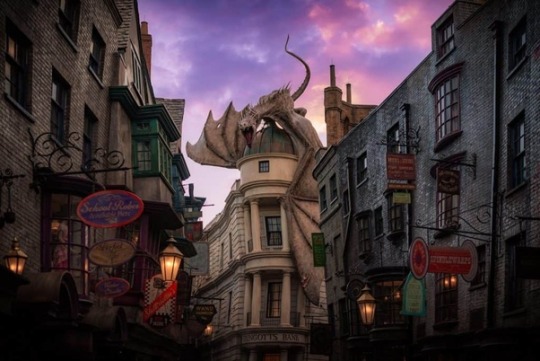
One of the greatest things about Universal was its phenomenal attention to detail. You can hear Moaning Myrtle’s voice in the women’s bathroom, and only the women��s bathroom. The walls of the Three Broomsticks have shadows of a broom sweeping by itself and an owl flying projected against the wall, so convincingly that you’ll do a double take when you see it. Knockturn Alley is down a little secret tunnel off of the main street, and that’s where you have to go to buy Dark Arts-themed stuff. It’s really well done.
Another thing that contributes to the vibe, in my opinion, is that the wizarding world is slightly macabre. They eat candy shaped like frogs, flies, mice, and so forth, and they have gross-tasting jellybeans. In the film’s version of the Diagon Alley sequence above, there’s a random shot of a pet bat available for purchase. In the third film, when Harry is practicing the Patronus Charm with Lupin, the candles are shaped like human spines. In the first book, this is Petunia’s description of Lily’s behavior after she became a witch:
Oh, she got a letter just like that and disappeared off to that-that school, and came home every holiday with her pockets full of frog spawn, turning teacups into rats. I was the only one who saw her for what she was — a freak!
—Philosopher’s Stone, Chapter 4
I remember reading this for the first time, and it just kind of made intuitive sense to me. I suppose it fits into the “eye of newt and toe of frog” association between magical people and gross things, but somehow it works. Unfortunately, this is retconned later with the knowledge that wizards can’t use magic outside school, but before that limitation gets imposed, the idea of Lily amusing herself by turning teacups into rats seems like an inherently witchy thing to do.
That association between magic and the macabre shows up elsewhere, as well. In The Owl House, Luz’s interest in gross things is one of the things that marks her as a “weirdo” in the real world. When she goes to the magical world of the Boiling Isles, weird and gross stuff is absolutely everywhere. That world’s vibe leans more towards the macabre than the whimsical, but it works because you sort of expect the gross stuff to exist alongside the concept of witches, and that they would be an intrinsic part of the world they inhabit. You don’t question it, because it’s part of the vibe.
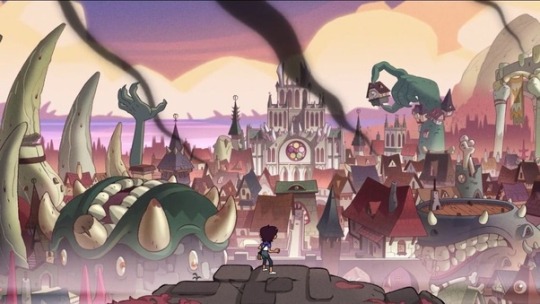
(The Owl House is one of the few things I’ve encountered that has a similar vibe to Harry Potter, but it’s still not the same vibe. In fact, The Owl House outright mocks the expectation that magical worlds be whimsical, and directly mocks Harry Potter more than once. The overall vibe is much closer to Gravity Falls.)
The Harry Potter films utilize a lot of similar soft worldbuilding with the background details, especially in the early films that were still brightly-colored and whimsical. For example, the scene in Flourish and Blotts in the second film has impossibly-stacked piles of books and old-timey looking signs describing their subjects, which include things like “Celestial Studies” and “Unicorns.” When Harry arrives in the Burrow in the same film, one of the first things he sees is dishes washing themselves and knitting needles working by themselves, taking completely mundane things and instantly establishing them as magical. In that Patronus scene with Harry and Lupin, the spine-candles and a bunch of random orbs (and the obligatory giant armillary sphere) float around in the background. One small detail that I personally appreciate is the designs on the walls above the teacher’s table in the Great Hall, which are from an alchemical manuscript called the Ripley Scroll:

It’s all these little things that add up to produce The Vibe.
Obviously, much of the vibe is expressed very well in John Williams’ score for the first three Harry Potter films. The mystical minor key of the main theme, the tinkly glockenspiel, the strings, the rising and falling notes that mimic the fluttering of an owl, the flight of a broomstick, or the waving of a wand. That initial shot of the castle across the lake as the orchestra swells, as the children arrive at their wizarding school:
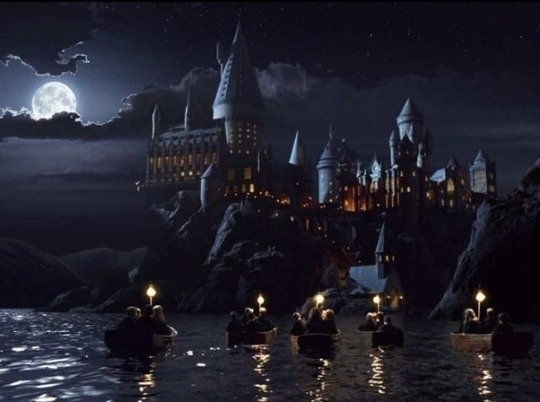
If you grew up with Harry Potter, just looking at this image gives you The Vibe. The nostalgia hit is definitely part of it, but The Vibe was already there, back when you were a child and you didn’t have nostalgia yet.
In my opinion, only Williams’ score captures this vibe — the later films, though their scores are very good, do not. But the soundtrack of the first two video games, by Jeremy Soule (the same person who did Skyrim) absolutely nails it. This, right here, is Harry Potter’s vibe, condensed and distilled:
youtube
This is why I feel invalidated by the common advice “just read another book.” I have read other books. I’ve read plenty of other books, many of which are wonderfully written and have left an impact on me. But there’s still only one Harry Potter. To date, there’s only other book that has filled me with a similarly intense longing for a fictional place, and that is The Night Circus by Erin Morgenstern. That book deliberately prioritized atmosphere over everything else in the story, and actually lampshades this in-universe. The Night Circus has a plot and it has characters, but it’s not about its plot or characters. It’s about the setting and its atmosphere. It swallows you up and transports you to a fictional place that is so evocative and so magical that you just have to be part of it or you’ll die. And even then, The Night Circus has a different kind of vibe from Harry Potter. In this particular capacity, there’s nothing else like Harry Potter.
The thing is, I don’t think Rowling was being as deliberate as Erin Morgenstern. (In fact, given many of Rowling’s recent statements, I question how many of her creative choices were deliberated at all.) She was throwing random magical stuff into the background without thinking too hard about it, which works when you’re writing a kids’ story, but stops working when you try to age it up. Actually, scratch that — soft worldbuilding is definitely not just for kids! The Lord of the Rings has a soft magic system, for crying out loud, and Tolkien is the original archmage of worldbuilding. Don’t listen to anyone who tells you that prioritizing atmosphere over meticulousness is bad worldbuilding. That is a valid way to worldbuild! Not everything needs to be clearly explained, not everything needs to make sense. The problem is that Harry Potter doesn’t balance it well. Certain things do have to be explained in order for the magic to play an active role in the story (and the setting of a magic school lends itself to that kind of explanation), but no rules are ever established for the kinds of magic that need rules. When you begin thinking about the rules, you’re no longer just enjoying the magic for what it is. At worst, you begin running up against the Willing Suspension of Disbelief.
It wasn’t actually the “aging up” of the story that did it in, per se, but rather, the introduction of realism. The early books were heavily stylized, and the later books were less so. A heavily stylized story can more easily maintain the Willing Suspension of Disbelief. That’s why, for example, you don’t ask why the characters are singing in a musical — you just sort of accept the story’s outlandish internal logic, and the inherent melodrama of it doesn’t take you out of the story. Stylized stories are more concerned with being emotionally consistent over being logically consistent. The later Harry Potter books changed their emotional tone, but without changing the worldbuilding style to compensate.
In addition to the more mature themes and darker tone, Harry Potter introduced more realism as it went, but Rowling did not have the worldbuilding chops to pull this off. There’s the basic magic system stuff: When you begin thinking about it too hard, something like a Time-Turner stops being a fun magical device, and starts threatening to break the entire story. Then there’s the characters: Dumbledore leaving Harry on the Dursleys’ doorstep in the first book is an age-old fairy tale trope that goes unquestioned, but with the introduction of realism in the later books, it suddenly becomes abandonment of a child to an abusive family. The exaggerated stereotypes of characters like the Dursleys become tone-deaf. The fun school rivalry of the House system is suddenly lacking in nuance. And then there’s the shift in tone: The wizarding world that we were introduced to as a marvellous place is revealed to be dystopian. You start thinking about how impractical things like owl messengers are, you start wondering if Slytherin is being unjustly punished, the bad history appears glaringly obvious, the quaint archaisms become dangerously regressive. Oh, and the grand feasts are made through slave labor! The wizarding world suddenly feels small and backward instead of grand and marvellous. J.K. Rowling’s bigotry throws it all into an even harsher light.
This is why I’ve always preferred the early books and films to the later ones. There’s a lot of things I like about the later ones, but they’re not as stylized — they don’t have The Vibe. Thinking about things too hard is just a necessary condition of adulthood, but it’s still possible to tell a dark, mature story that is highly stylized. I really think JKR could have better pulled off that shift if she was a more competent worldbuilder. But it is painfully obvious that she did not think things through, and probably didn’t understand why she had to. In her defense, she did not know that her story would end up being one of the most scrutinized of all time. As it stands, her strength in worldbuilding was in the softer, smaller, deliberately unexplained moments of magic that were there just to provide atmosphere. And there were less and less of those as the books went along.
Pretty much all the Harry Potter-related content released since the last film — including Cursed Child, Fantastic Beasts, Hogwarts Mystery, Hogwarts Legacy, Magic Awakened, and that short-lived Pokemon Go thing — have been unsuccessful attempts at recreating The Vibe. In fact, the only piece of supplemental Potter content that I think had that Vibe down pat was the original Pottermore, back when it was more of an interactive game. And of course that got axed. That was right around the time things started going downhill.

Some of the art from Pottermore’s original Sorting quiz.
So what now? Well, that’s the question.
I think I can safely say that The Vibe was the reason I liked Harry Potter. It’s the thing I still like the most about it. I’ve spent years chasing it, like an elusive Patronus through a dark wood. If I can capture and distill that Vibe, and use drops of it in my own work, then perhaps I won’t need Harry Potter anymore.
I'm gonna write the story that I wish Harry Potter was, and when I'm a famous author, I won't become a bigot. I'll see you on the other side.
#harry potter#harry potter fandom#harry potter analysis#j.k. rowling#jk rowling#anti jkr#fuck jkr#screw jkr#anti jk rowling#fuck jk rowling#writing#worldbuilding#soft worldbuilding#soft magic#magic system#fantasy worldbuilding#fantasy writing#moving on from harry potter#moving past harry potter#long post#wizard#hogwarts school of witchcraft and wizardry#wizarding world#vibes#analysis#Youtube
39 notes
·
View notes
Text
Ways to solve the Why Can’t They Use Magic To Fix Everything problem:
•Magic has a cost. The more powerful the spell, the more it drains the caster’s life.
•’We tried that ages ago.The gods grew angry at our arrogance and stripped most of our powers away.’
•Magic is tied to the stars and planets. Its full potential can only manifest on certain astrological events.(And these are once-in-a-millennia type events)
•Only one will a pure heart and selfless intentions can use their full power.
•All magic users are descendants of a (god/spirit). As the years have gone by, the blood has become more diluted, and magic has grown weaker as a result.
•Spell casters can only cast (finite number of spells). They end up using their gift on trivial matters.
•’After the war, we realized the dangers that magic presented. And so we sealed it away, lest it destroy the world.’
•Everyone has magic. Trying to solve one problem is futile as it can be easily undone(often violently and with much destruction)
•inverse of the above: everyone has magic, but their powers are limited and (mostly) harmless.
•Individual, company, or nation has a monopoly on the only substance that can negate magic. As they rule the world, they have installed anti-magic devices everywhere.
•Individual, group, company, or nation has a monopoly on magic. To insure their grip on power, all magic users that do not submit to them are killed.
•An act of good will spawn one of evil. The use of fire will cause somewhere to grow cold and dark. And to save a life, one must sacrifice another.
•The only magic people have access to is Chaos Magic. No one uses it, for obvious reasons.
—••• •• ——• ——• • ••• —•• •• —•—• —•— ••— •••
#writing#creative writing#writing inspiration#writing problems#writing resources#writer#writers#writers and poets#magic#magic system#writer on tumblr#writeblr
4K notes
·
View notes
Text
ok the last post was infodump friendly. this one is NOT.
i expect you to explain your/something about your magic system as badly as possible. i want to be confused. i want to lack context.
i'll start:
big wyrm gives off radiation that is also magic. ohhh no gas.
#i am definitely not doing these posts because im procrastinating actually working on my stories what makes you say that#writeblr#original fiction#worldbuilding#writers on tumblr#writeblr tag games#maybe? you guys can do it if you want#im not sure who to tag tho so im just leaving this open#creative writing#magic system
1K notes
·
View notes
Text

#motherwilds#webcomic#worldbuilding#artists on tumblr#webtoon#nature#illustration#art#digital art#cross section#magic system
270 notes
·
View notes
Text
cirque de la vie lore!
some cirque de la vie lore crumbs for those interested!
if you haven't come across the au yet, here is a list of posts as of now:
the songbirds+skizz and tango
etho and bdubs
martyn and cleo comic part 1
comic part 2
comic part 3
IMPORTANT: the magic/sigils system used in this au (specifically the symbols themselves) is original- it's something i pulled directly from my oc's universe because i didn't want to make a whole new elemental magic system. that being said, outside the context of this au, PLEASE DON'T USE IT! i have other plans for my oc project eventually, and i'd like to keep the system within the realm of my work
and here we go!
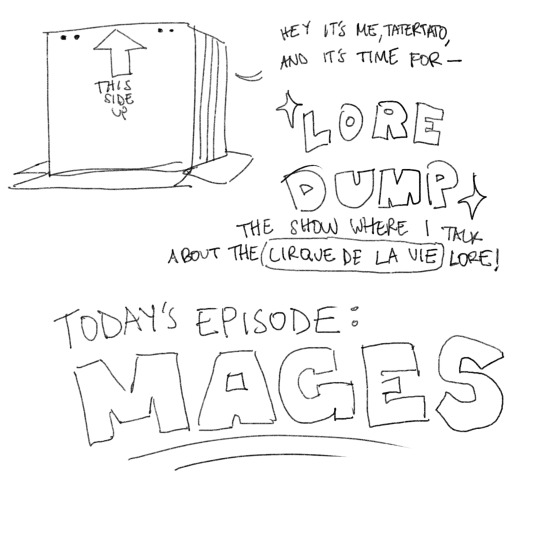
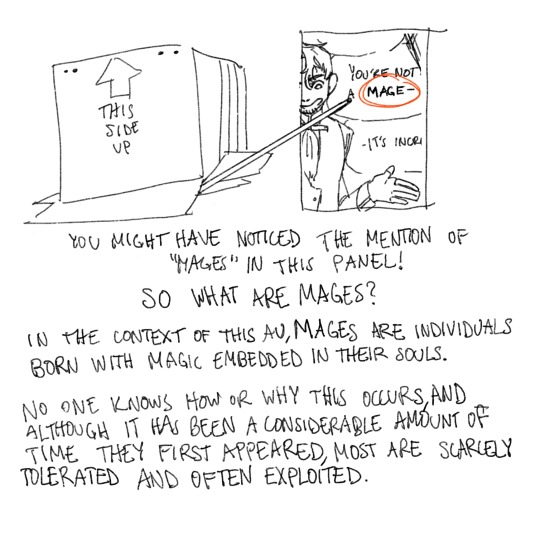
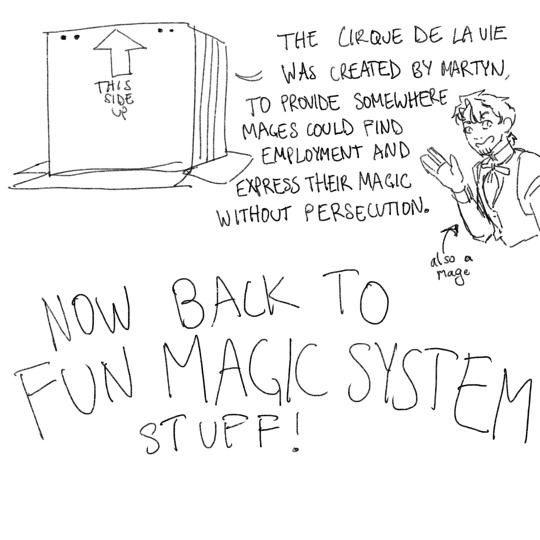
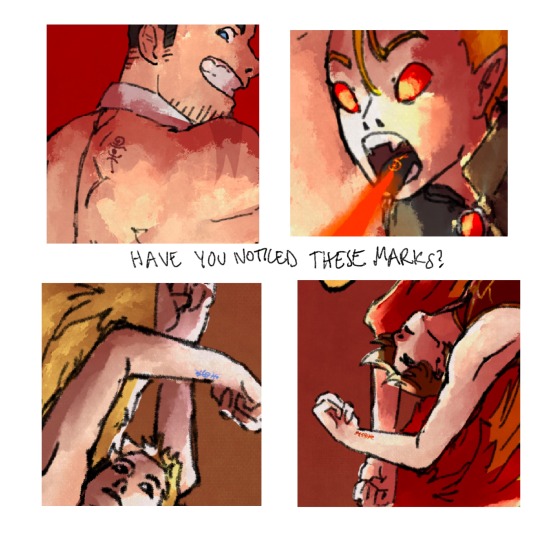
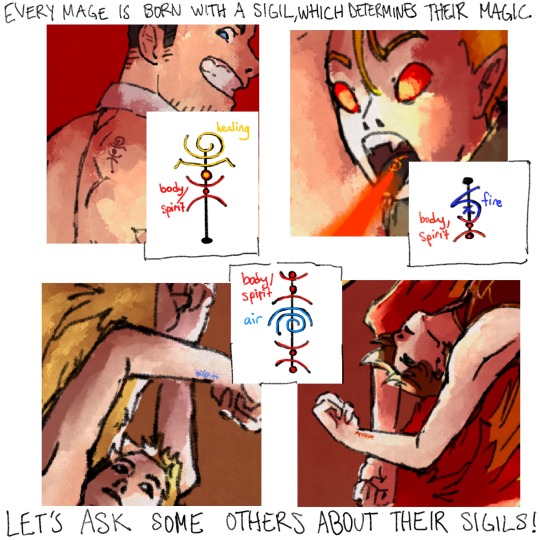
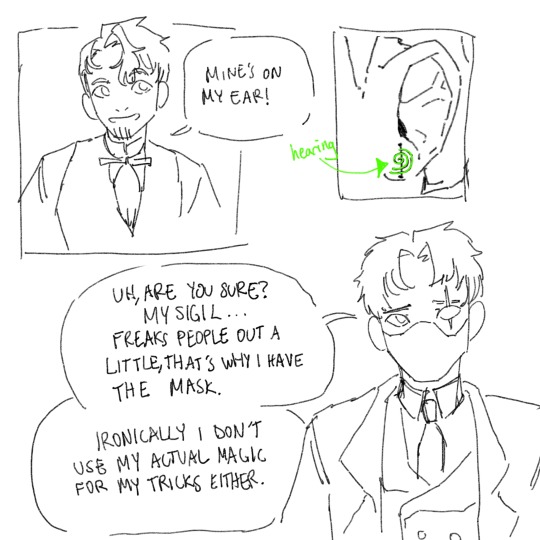
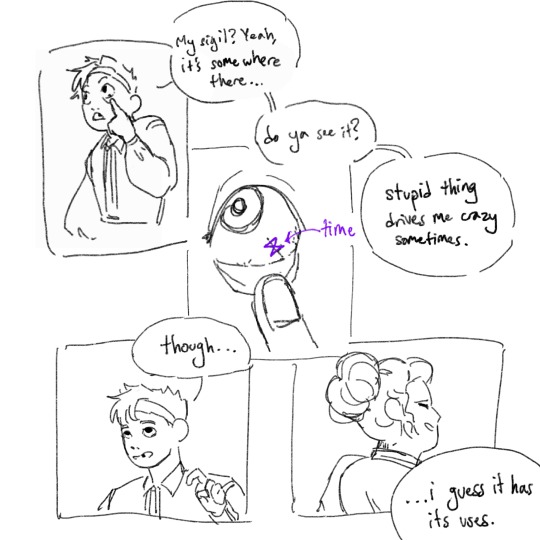
and that's all! if you have any questions, my ask box is open!
coming soon: shinyduo!
#traffic smp#trafficblr#life series smp#3rd life#secret life#double life#last life#limited life#magic system#world building#life series au#CirqueDeLaVieAU
296 notes
·
View notes
Text
Plot Holes and How to Fill Them (Or, The Hidden Potential in Your Mistakes)
“But why didn’t they just do that earlier!”
“You can time travel – so time travel!”
“Doesn’t X have Y spell? Why aren’t they using it to escape?”
“You. Have. Telekinesis! How are you this stupid?”
Plot holes! The bane of every writer’s existence. You think you’ve polished your beautiful manuscript, you have it all sent out for the masses to consume and praise and shower with compliments and adoration… and then they start tugging at a thread that may or may not begin to unravel your entire story. You’ve read this thing top to bottom, forwards and backwards and upside down, so many times the letters are burned into your brain. You mumble your monologues in your sleep — how did you not see this? How do you fix this?
See this post about beginning the writing process that might help you avoid opening a plot hole entirely with a solid enough script and outline.
Types of Plot Holes
Your magic system’s established rules have just been broken for TeNSioN
Your Deus Ex Machina really did come out of nowhere and is quite out of character
Why doesn't Character just run away from a fight they can't win?
Characters forgetting they have superpowers, extreme intelligence, handy tools or weapons, survival skills, common sense, or crucial information to escape and/or solve a situation
Characters dying for the above mistakes when said death could have been avoided
The entire story could have been avoided had Character A just told Character B the truth
Character X should have known ___ all along given their profession/backstory/friend circle/education/personality
And variations of the above, I’m sure I’m missing a couple. Fixing plot holes generally come in two camps: Those you can fix by rewriting the existing manuscript that contains the hole, or those you have to work around from a previous manuscript that’s already been published.
Why Plot Holes Happen
Plot holes happen in reality. Expecting your first, second, or 15th draft to be completely foolproof is utter nonsense. Real people forget stuff they’re supposed to know all the time, tools that would be useful are left behind, GroupThink makes very bad decisions.
The difference is: You are writing fiction. Your goal is to be entertaining, not necessarily realistic. A character simply *forgetting* Macguffin X at the climax of the story does not make for an entertaining read, no matter how likely it might be to happen in the real world.
You’re making this entire world up as you go and that alone is an impressive feat millions of others can only dream about – cut yourself some slack, okay? Everything is fixable.
Plot holes also happen because we’re so engrossed in our own story that we forget it’s all made up. You’re 22 chapters into a 24 chapter novel and you’ve just realized your psychic hero would never have been caught unawares like this. “But that’s just how he is!”
No. Stop. That’s not just how he is. That’s just how you wrote him – and you can go back and un-write him. Any excuse you can dream up you can un-write, and unfortunately, you’ll likely have to do a fair bit of it if you still have the opportunity.
Plot holes generally open long after the inciting incident that causes them. If you’re going to fix it, duct-taping together a solution in that very same scene isn’t the way to do it. You have to figure out why it’s a hole at all, then go back and fix its foundations.
Finding Your Own Plot Holes
Sometimes you’re lucky enough to stumble upon them before it’s too late. A fair bit of the time, though, your audience has to tell you. Finding your own plot holes requires stepping back from your work and looking at it like you’re just a reader, not the author.
Read your plot out loud to yourself and keep asking questions like:
Does this make sense for the scene?
Does this only exist to look cool at the cost of logic?
Are these rules I wrote too easy to break or contradictory in any way?
Is there any other way for this character to escape this situation?
Is the only solution here too contrived?
That, and having an army of beta readers who should show you flaws you’ve overlooked. Even then, some things just aren’t obvious at all until someone too smart for their own good points out something no one else considered before.
It’s okay. It’s not the end of the world.
Filling Plot Holes
Fix your broken magic system
A “magic system” broadly describes any type of powers/abilities/supernatural entities that function in your world. They can be in high fantasy, urban fantasy, sci-fi, or any genre really. The Force is a magic system, as much as is bending in Last Airbender even if no one calls it “magic”.
For example: Force users are telekinetic… and yet don’t simply repeatedly spam the “chuck my enemies into a wall/off a cliff/anywhere that is away from me” button. It’s what you’d call a “soft” magic system, it doesn’t have explicit rules on how and when it can and should be used. It just *is*.
Fixing holes in your magic system first demands examining why you wrote it the way you did, why you gave it these specific rules, or why you didn’t, and all the ways characters should otherwise be able to use it when your story demands they get creative.
For soft magic systems — never let the magic system win the day. It invites far too much scrutiny. Gandalf from Lord of the Rings is a Wizard. He can do an undefined number of spells and has an unclear number of abilities and limit to his reach. Gandalf’s magic is never the saving grace of the Fellowship. So asking “why didn’t Gandalf just do X” isn’t ever a question people have because success never depends on Gandalf doing X.
Everyone hates on the time turner in Harry Potter, as they should. Time travel is essential to the plot of Prisoner of Azkaban, without it the heroes fail. And yet, because it is time travel, why it never existed earlier and why they never use it again to solve more massive plot problems is a valid question. As goes with many spells and abilities in the series.
For hard magic systems — remember that you wrote the rules, you can go back and change them at any time before it’s published. Bending in Last Airbender is rarely the focus of any conflict. Yes, two benders will fight each other, but it’s not “who’s the stronger bender,” it’s “who’s smarter with their element”. Who better uses their environment? Which one is racing against a clock before reinforcements arrive and overwhelm them? Which one runs the risk of exposing themselves if they start bending? Whose mental state is crippling their bending today?
These are all character-driven explanations for why certain abilities do or don’t manifest in a given scene… until the finale when it really is just a clash of red and blue aura lasers.
There is never a scene where a character is trapped when they shouldn’t be. Never a “why didn’t you just X” moment, because it’s never about the bending, it’s about the bender.
Turn plot-reasons into character-reasons
This means taking a “why don’t they just do X” and making the reason because one of the protagonists is morally against doing it, not because the hand of the author demands it.
In Last Airbender, Aang is vocally against simply killing the Fire Lord. It would be easier, it would risk far less casualties and carnage, it’s fastest. And yet. Aang doesn’t do it simply because he’s not strong enough or he doesn’t have some magical super weapon, or the stars have aligned and now he’s lost a very convenient ability – Aang doesn’t want to take the easy road because that’s who he is as a person.
He’s been raised as a monk to value the preservation of life above all else (ignoring any accidental casualties over the course of the series). Him being desperate to not simply kill Ozai is central to his character and even when he has the chance in the climax of the fight, he still doesn’t take it.
Now “why didn’t you do that earlier” does, still, concern the “energy bending” established out of nowhere just for the finale so Aang doesn’t have to compromise his morals to win… but the show is so damn good and Ozai’s just desserts so damn sweet it doesn’t really matter.
Making these plot decisions character decisions, so long as they are in-character, gives some juicy potential for schisms within Team Protagonist as fan favorites clash over ideals and morals and whether or not the greater good is worth them sacrificing something so central to their being.
This also applies to characters not sharing crucial information with each other. Make them distrustful of the others, or let them attempt it anyway and have some other consequence for the effort. Anything is better than a character sitting on valuable info simply to maintain the mystery.
Avoid Deus Ex Machinas
The “surprise reinforcement cavalry charge” is one of my favorite deus ex machinas in fantasy. Everybody cheers, it looks amazing, the music is swelling, our heroes on the battlefield realize they haven’t been forsaken by their friends, etc. In Lord of the Rings, yes, Theoden could have arrived 30 minutes earlier and saved even more lives, but we already knew he was on his way moving as fast as he could without exhausting his horses. Theoden’s army also took care of the bulk of the battle so when Aragorn arrives with the second surprise reinforcements, it’s less a decisive blow that comes out of nowhere and more the victory lap.
In “Battle of the Bastards,” Game of Thrones has its third surprise cavalry charge of the series, only this one much more explicitly comes to save the day. The difference between this scene and Theoden’s charge is: Audiences had no idea Littlefinger was on his way, and neither did Jon Snow. Had Sansa told him she had a plan, Jon could have waited. He wasn’t backed against a wall and forced to fight right then and there, he could have stalled an extra hour by just not showing up to the battlefield to wait for his cavalry. With Sansa inexplicably not telling him, she risked his life and the lives of his entire army because the hand of the writers wanted to keep it a surprise. Worst of all, when the battle is over, he compliments her decision, despite all the blood on her hands.
Surprise reinforcements, saviors, powers, and abilities always run the risk of “why didn’t they do that earlier” and you should be asking yourself the same question. If you can’t come up with an explanation other than “because it’ll look cool” go back to the drawing board.
Or, have your very own characters pissed that the savior didn’t just do that earlier. Have your characters ask where this special power was, have it mean something to them and the story at large. Had Jon been angry with Sansa, given their incredibly pyrrhic victory and the potentially avoidable death of their youngest brother, it might’ve made for some interesting character drama.
Give your saving graces deadly costs
“Why didn’t they just do X earlier?”
“Because doing X would have killed Character D, dummy.”
Giving your super special magic, mutant, super, or supernatural powers costs, drawbacks, and limitations forces the characters who use them to not resort to them every single chance they get. Their magic drains their physical stamina, or the demon they made a deal with camping in their brain threatens to overtake their psyche, or the sword is cursed and every time the hero raises it in battle, they lose a little piece of themselves. Or, using this creepy power strains their relationship with their friends or community.
Without risk and consequences, you cannot avoid “why didn’t they do that earlier,” because the only answer you have to give is “because I, the author, said so.” The only time a character is allowed to have selective amnesia about their superpowers is if it’s been established beforehand as a potential problem. Then it’s not “this came out of nowhere.” Then your audience is dreading the entire time waiting for that chekhov’s gun to fire.
Don’t compromise your story for sensationalism
I can complain about ~subverting expectations~ in another post, but what I mean here is this: Are you writing this scene purely for shock value, for the sake of a twist, because a story this grim demands at least one character death, or because it’s going to look epic?
In this post about pacing and this post about how to write tone, I talked about making your scenes pull double duty. You can write a scene for shock and awe, but if it’s at the expense of a character’s integrity or intelligence, come up with another way to make it spectacular.
You want the villain to monologue to give the heroes time to save the world? Then write a villain with an ego and personality that would monologue. You want the hero to be a one-man-army? Then write their personality as the lone wolf type and have it be a flaw of theirs that they keep striking out alone, consequences be damned.
You absolutely need the hero to not take the easy road and fight the bad guy without using their most effective weapon? Give them a reason to stall this fight. Maybe they really do need to simply run out a clock, or they don’t actually want to kill/subdue their opponent, or in doing so, the villain’s death is what causes the Bad Thing to happen.
If I write a character that can kill with just a look, every time I put them in a dangerous situation I need to then justify why they don’t do that over and over again, unless it’s by their own stubborn integrity that they choose not to.
If I write a villainous plan so devious and well thought out, the only thing standing in the way is living protagonists? I need a reason the villain doesn’t just murder the heroes every chance they get. Maybe they’re internally struggling over actually going through with it, or their ego demands the hero doesn’t get a quick or honorless death, or they do actually need a living hero for the plan to work.
Fixing Plot Holes in Sequels
All of the above is advice for issues within the same manuscript. What happens if you’ve already published and have the chance to address a known plot hole in the sequel?
About the worst thing you can do is slap in a throwaway line or hasty explanation to cover your ass. Everyone reading and watching will notice. Saying nothing is better than saying that.
See the duct-tape in Rise of Skywalker when the heroes explained that they couldn't just hypersspace-jump another ship into the enemy fleet because it worked so horribly effectively last time. Doesn't matter that they could have put it on autopilot or sacrificed a droid, or that, at any point in the history of Star Wars, someone else could have and should have done this desperate maneuver. For the sake of "looking cool" it opened an entire sinkhole.
Less a “hole” and more an inconsistency — the pegasus Blackjack in Percy Jackson is explicitly a mare, a female horse, in one book, and then inexplicably male in later books. Why? Well the author made a mistake, simple as that. He did *not* attempt to explain this error away or dig the hole deeper. It just is. Though I’m not sure why Blackjack couldn’t just stay a mare and how he didn’t reference the previous book when writing the sequel is a bit baffling.
If your heroes can no longer use the Deus Ex Machina they used before – have them attempt to use it, and then come up with a solid reason why it’s not possible. Maybe it was one-time use, or the savior simply doesn’t want to, or the cost/risk is too high to attempt it again, or it simply can’t be found and it’s very frustrating.
Have the heroes be morally opposed to doing what they did before, or overconfident, or skeptical that it will even work again only for that choice to bite them in the ass later. Have the magic item all used up, the recipe to recreate it lost to history. There’s a hundred better excuses than the hand of the author simply saying so.
—
If you aren’t going to write a sequel and you accept living with the plot hole unfilled… chances are people are going to love the story despite its flaws. Harry Potter is the poster child of “why didn’t they use X spell to solve the problem” or “they have a spell for X, yet they don’t have a spell for Y?” and how many people love that story?
In the end, a plot hole can be tiny or massive and chances are the story you told is entertaining enough to make up for it. It’s just a story, it’s just fiction. Learn from your mistakes so the next piece you create is even better.
308 notes
·
View notes
Text
In fantasy settings, they usually show that a character is super powerful or talented because they don't have to chant their spells out loud, and can just manifest them silently.
I want a fiction where the powerful / talented person realizes that spells are supposed to be sung. Chanting is close enough to be effective, but the true emotion and the mental focus to channel out spells the way they were supposed to be only comes out when the words are expressed as a song.
Bonus points if all the mystical hand signs and gestures work better as part of a dance.
#fiction#fantasy#worldbuilding#fantasy worldbuilding#magic system#music#song#music is one of the oldest arts
541 notes
·
View notes
Text
Mastering the Art of Necromancy in Your Fantasy Novel

Hello fellow writers and conjurers of fantastical worlds,
In the tapestry of fantasy literature, few elements hold the allure and enigmatic charm of necromancy. The art of communing with the spirits of the departed, wielding the powers of death and undeath, and delving into the mysteries of the afterlife conjures a rich and eerie tapestry that captivates readers and writers alike. In this comprehensive guide, I shall help you embark on an odyssey into the realm of necromancy, unraveling its nuances, and harnessing its potent essence to enrich the worlds and characters within your fantasy novel.
Embracing the Essence of Necromancy
Necromancy is a mystical strand woven into the very fabric of fantasy literature, offering writers a gateway to explore themes of mortality, forbidden knowledge, and the uncharted territories beyond death. The art of necromancy beckons us to navigate the delicate balance between life and death, weaving a narrative tapestry that shimmers with eerie allure and spine-tingling intrigue.
Understanding the Arcane Threads of Necromancy
1. Unraveling the Nature of Necromantic Magic:
Necromancy encompasses a vast array of mystical practices, ranging from communing with spirits and animating the dead to harnessing the energies of the afterlife. Understanding the scope of necromantic magic is crucial when integrating it into your fantasy world.
2. Delving into Ethical Quandaries:
The art of necromancy often delves into moral ambiguity and ethical quandaries. As a writer, explore the complex interplay between wielding power over life and death, and the consequences it imposes on both wielder and world.
3. Crafting Necromantic Characters:
Characters draped in the shroud of necromancy carry an undeniably enigmatic allure. Whether they are enigmatic necromancers, vengeful revenants, or tormented spirits, imbue them with layers of depth, conflict, and the allure of forbidden knowledge.
4. Cultivating the Atmosphere of the Necromantic World:
Infuse your narrative with an eerie and otherworldly ambiance that resonates with the essence of necromancy. From desolate graveyards to spectral realms, let the setting itself exude an aura of haunting allure and metaphysical mystery.
5. Unraveling the Consequences:
The tendrils of necromantic magic often carry unforeseen consequences. Delve into the ripple effects of wielding such potent powers, shaping the fate of both the user and the world they inhabit.
Enchanting Your Narrative with Necromantic Flourishes
1. Rich Lore and Mythos:
Weave an intricate tapestry of lore and mythos surrounding necromancy, invoking ancient rituals, mysterious tomes, and the whispers of spirits to deepen the mystique of this arcane art.
2. Enigmatic Rituals and Spells:
Craft spells and rituals that exude an otherworldly aura, invoking the presence of specters and the echoes of forgotten souls to imbue your narrative with the esoteric essence of necromantic magic.
3. Ethereal Companions and Servants:
Bring forth spectral allies, reanimated guardians, and enigmatic spectral entities that serve as both catalysts and enigmas within the narrative.
4. Narrative Pivots and Twists:
Infuse your story with unforeseen twists and narrative pivots that stem from the tendrils of necromantic magic, shaping the destiny of characters and worlds with its potent influence.
Mastering the Art of Responsible Representation
1. Portraying the Nuances of Necromancy:
Embrace the multifaceted nature of necromancy, delving into its allure and peril, and steering clear of reductionistic portrayals that fail to capture the complexity of this enigmatic art.
2. Navigating Sensitive Themes:
Acknowledge the sensitive themes surrounding necromancy, portraying its enigmatic allure while respecting the boundaries of respectful representation and narrative integrity.
Navigating Ethical Quandaries and Moral Ambiguity
1. Delving into the Temptation and Consequences:
Illuminating the temptations and consequences inherent in wielding necromantic powers, delving into the moral turbulence and ethical crossroads that define the narrative and its characters.
2. Shaping Characters' Moral Journeys:
Embrace the moral odysseys of characters enmeshed in the tendrils of necromancy, illuminating their struggles, choices, and the transformative impact of their interactions with the enigmatic art.
Embracing the Mystique of Necromancy
The enigmatic tapestry of necromancy holds the potent key to unraveling the mysteries of death, whispered secrets of the afterlife, and the spellbinding allure of enigmatic power. Embrace its allure, wield its essence responsibly, and watch as your narrative flourishes with a haunting, spine-tingling allure that captivates readers far and wide.

Warm regards and unwavering encouragement on your enigmatic odyssey,
Ren T.
#creative writing#writing#writing tips#writers block#writeblr#thewriteadviceforwriters#on writing#how to write#writers and poets#witchcore#necromancer#necromancy#magic#high fantasy#worldbuilding#magic system
393 notes
·
View notes
Text
Fictional worldbuilding
I have this list I compiled of topics for developing of countries, whether fantasy based or not, and it seems to be a useful resource to share. Feel free to use this list to develop your own lore, but DO NOT claim it as your own or repost. It's pretty long, but I think it covers a lot of relevant topics for worldbuilding.
General
∎ Country name
- Etymology if possible
- Reasons for the name
∎ Does it take inspiration for a historical time period, aesthetic, or culture
∎ What sort of government is it
Important Places
∎ Main cities
- Layout of the city
- Economic or historical importance
∎ Other cities and places of importance
- Ports
- Mine cities
- Scholarly cities
∎ Seasonal or turistic places
Climate and Terrain
∎ Important lakes, rivers, mountain chains or other geographically relevant places
∎ Seasons
∎ Climate in general
∎ How does the terrain affect daily habits
∎ Important plants
- Agriculture
- Crops for export
∎ Important animals
- Livestock
Government
∎ System of government
- Nobility/aristocracy
-- Titles and inheritance/eligibility of titles
- Merchant class
∎ Current and past rulers
Social customs
∎ Entertainment
- Common forms of entertainment
- Games
- Cultural/social forms of enterteinment (go to parties/go to the movies/go out to eat/etc)
∎ Seasonal entertainment
- Vacations
- Seasonal high class customs
∎ Customs regarding reading and books
∎ Customs towards addictive substances
- Alcohol
- Tobacco
- Opioids
- Other stuffs
∎ Education and educational system
∎ Houses
- Home layouts
- Common things in houses
∎ Rites of passage
- Age to be presented as adult to the society and customs regarding it
∎ Manners and behaviour in public
∎ Religion
- Possible gods
- Holidays
- Festivals
∎ Customs regarding music
- Musical instruments
Notions of family
∎ Inheritance laws
∎ Marriage and concepts of marriage
- Marriage rituals
- Who is allowed to wed who
- Divorce
- Customs toward conjugal and domestic violence
- Polygamy
-- Extraconjugal affairs
--- Bastards
∎ Adoption
∎ Division of domestic labor and roles
Economy
∎ Coin and values
∎ Important internal products
∎ Main imports
∎ Main exports
∎ Important commercial relations
Fashion
∎ Common feminine fashion
∎ Common masculine fashion
∎ Concepts about clothing
- What is seen as vulgar
- What is seen as desirable
∎ Fashion and rites of passage
∎ Hairstyles and adornments
Names and language
∎ Base language
∎ Linguistic influences
∎ Working of names
- Family names
-- Patronymic and matronymic
- Personal names
Magic and technology
∎ Magic
- Practice of magic
- Permissions within magic
- Common and uncommon forms of magic
∎ Magic creatures of importance
∎ Level of technology
∎ Daily uses of technology
#worldbuilding#fantasy worldbuilding#worldbuilding tools#fantasy#high fantasy#magic system#world building#fantasy writing#fantasy world#urban fantasy#creative writing#fanfic writer#writerblr#writers block#writing#writers of tumblr#fantasy country#fanfic#fanfiction#fic ideas#fanfics#resources#for future reference#useful#helpful#for reference#writing tool#writing tools#writing resources#writing research
1K notes
·
View notes
Text
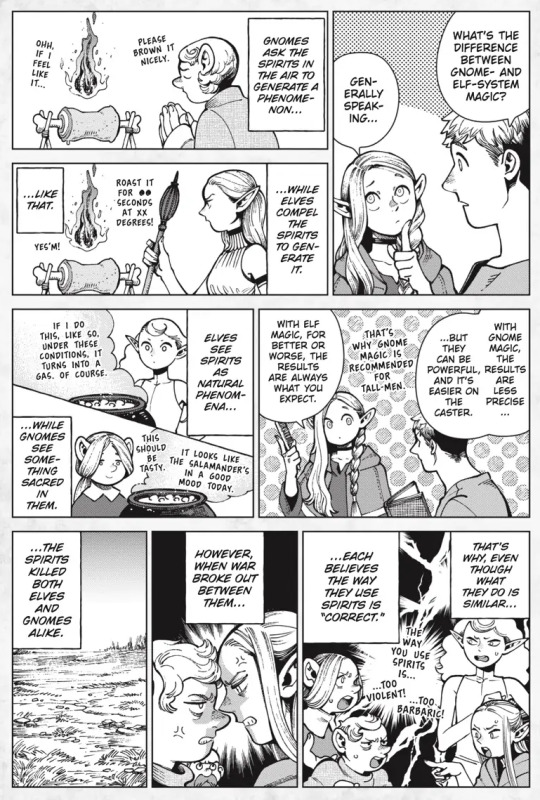
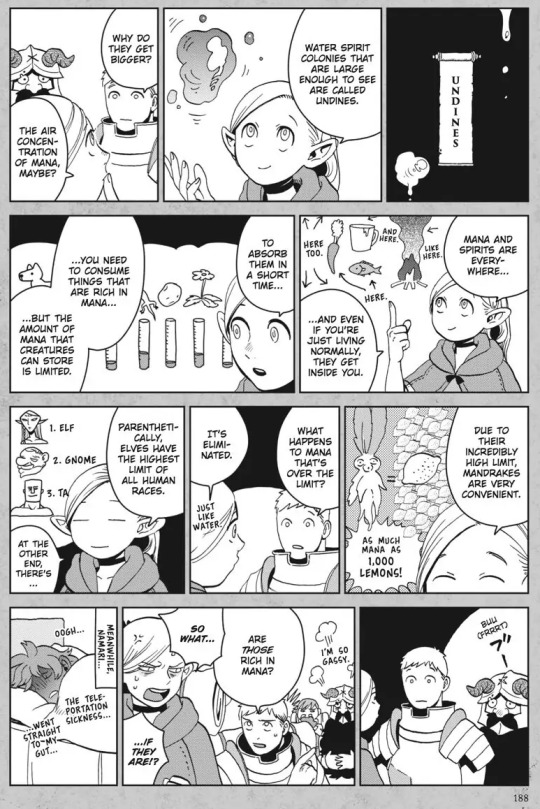

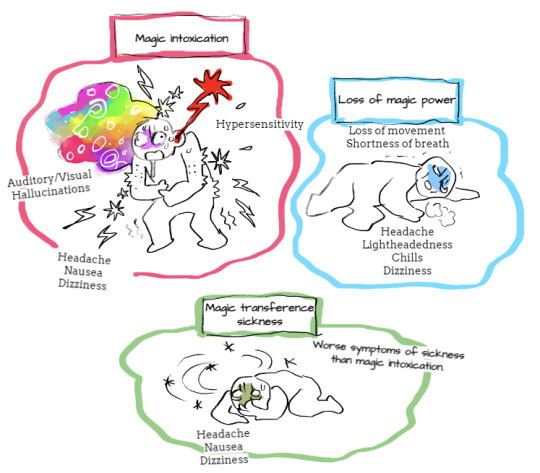
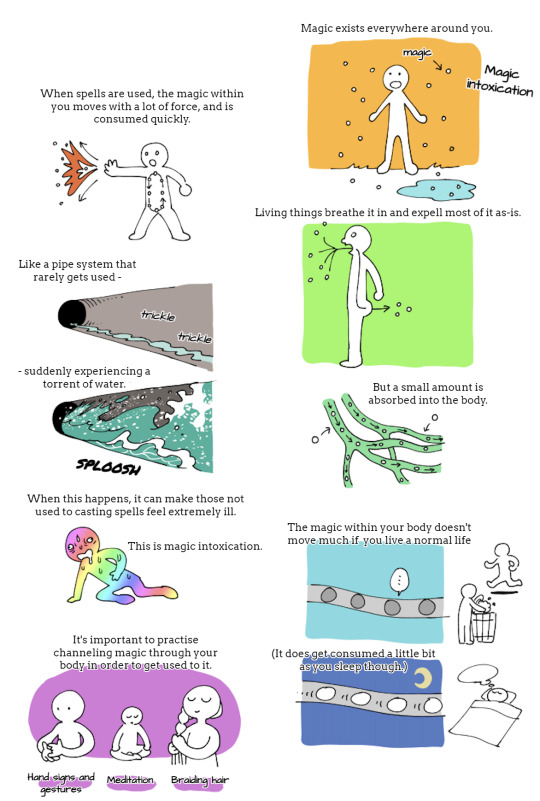
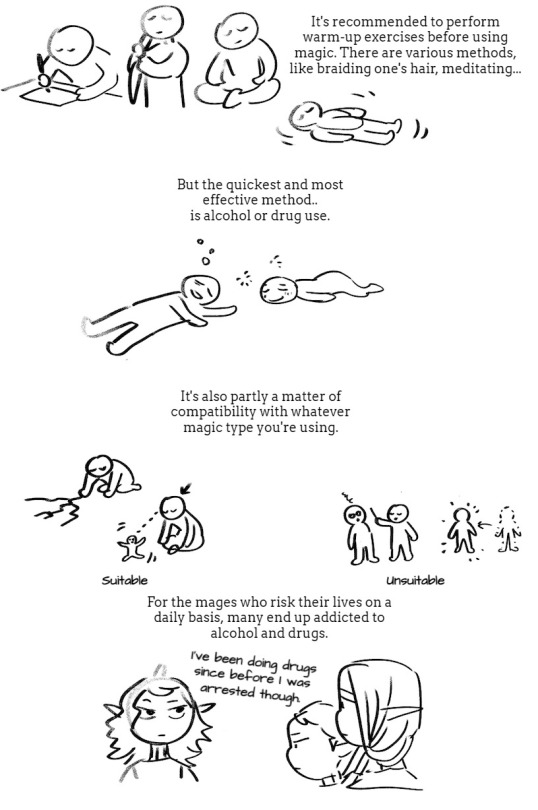
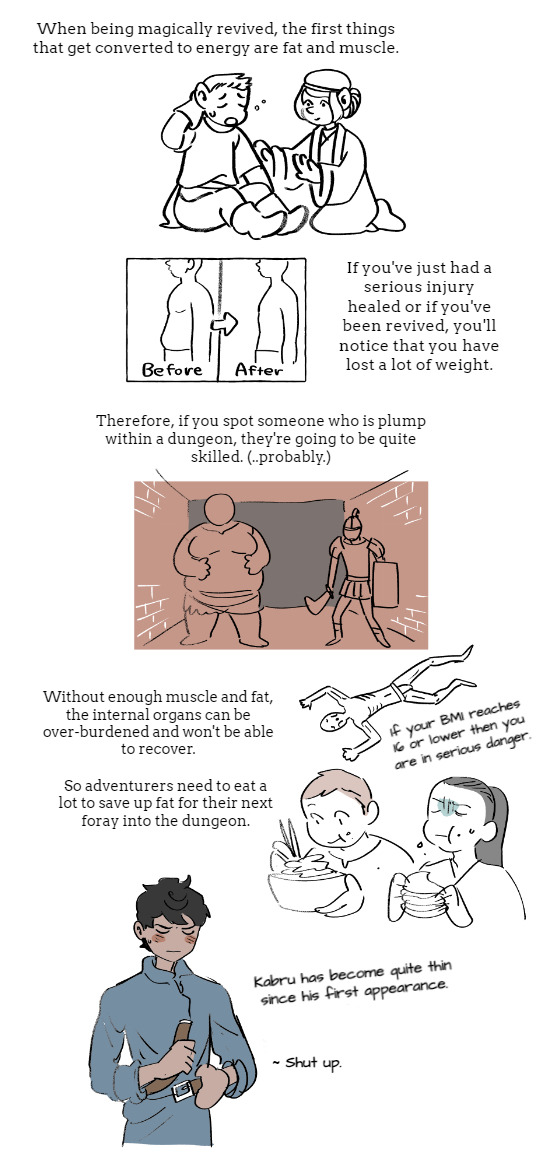
Dungeon Meshi Magic System - Bits about Magic and Mana
#dungeon meshi#magic system#for referencing#Compilation#Marcille Donato#Fleki#Kabru of Utaya#Ressurection magic#Mana#returning spell#Theres way more than this but I wanna gather more stuff before making a new post
9K notes
·
View notes
Text
Further elaboration: I am imagining the first attack spell a rookie learns. In a video game this is your absolute basic single target attack with no extra bells or whistles, the one spell you don't have to unlock and perhaps it doesn't even cost mana to cast. Please assume for the sake of this system that there would only be one attack spell this simplistic, so if you think there are multiple answers try to pick the most suitable.
347 notes
·
View notes
Text
More reasons why the characters cannot fix everything with magic
• Children all have access to magic, but as they get older, their powers fade away.
• Mastering even the most basic spell takes years of training.
• “We killed the gods. Turns out that doing that destroyed magic.”
• The amount and strength of magic is inversely proportional to the level of industrialization.
• Characters don’t know what kind of magic they have and must embark on a long and arduous journey in order to find out what they can do.
• “We can use magic, but only on the microscopic scale.”
• The reason why magic doesn’t work is that no one believes in it anymore.
• To cast a spell, one must play the correct tune on a specific instrument.
• Only maker of staffs, rods, and wands has a 10,000 year long waiting list.
• Magic comes from the stars…and it can go no faster than the speed of light.
• The power of magic waxes and wanes. Right now is the part of the cycle where magic is at its weakest.
• People once had a symbiotic relationship with organisms that gave them the power of magic. The organism has been extinct for centuries.
• As the use of magic has a destabilizing effect on the universe, a secret society exists with the sole purpose of killing all magic users before they destroy the universe (some of whom have deliberately attempted to cause an apocalypse).
• “You must sacrifice a part of you in order to use magic. It could be a part of your body, it could also be your identity, or even your very soul.”
#writing#creative writing#writing resources#writing inspiration#writing prompts#writing reference#magic system#writer#writers#writing community#writer on tumblr#writeblr
734 notes
·
View notes
Text
I want a magic system that slowly drains its users. Like magic drugs but they aren't the fun kind of drug but the life ruining kind. Magic users will slowly grow paler, their weight will drop at unhealthy rates, dark marks will form around eyes that slowly seem eternally bloodshot. As time goes on they lose reproductive function, and start feeling either constantly awake or needing to sleep more. Someone who begins practicing magic in their teens will not see forty.
You're so powerful but at what cost. You're bodies wasting away, and the younger you start the better. If you stopped now mabye you could heal... but it feels so good to become something like that, something more powerful then humanity was meant to know.
Anyone want to just totally ruin their life when they become a wizard?
#196#my thougts#worldbuilding#fantasy#my worldbuilding#my writing#writing#world building#magic system#magic#magic systems#wizard#worlock#dark fantasy
349 notes
·
View notes
Text
Brandon Sanderson’s Laws of Magic, Expounded
0. Err on the side of awesome
Tons of stories actually start with an awesome idea that is fleshed out.
You can always work out how to make the awesome fit into these rules.
1. An author’s ability to solve conflict with magic in a satisfying way is directly proportional to how well the reader understands said magic.
Deus ex machina is to be avoided at all costs.
There is a sliding scale of “sense of wonder” and “solving problems with magic”/scientific explanation of magic. You lose wonder as you increase science, and vice versa.
Main characters tend to use magic tools instead of magic itself to do this. Think monkey’s paw stories.
Ex. The One Ring is more science, and Gandalf in LotR is more wonder, especially since most of his magic is offscreen. His magic is there to keep the hobbits small and relatable to readers. The One Ring is used by Frodo to solve problems.
This is also a law of foreshadowing, especially since wonder can become science later in the book or another book in the series. Can also be how a magic mystery is solved.
2. Flaws or limitations are more interesting than powers.
Cost and stakes for using magic plays a big part into limitations, too.
Basic limitations as a plot device: someone has better magic; characters cannot use magic; a character’s magic isn’t working/lost; a character/people don’t understand the magic enough
Magic limitations can be combined with character flaws/limits, and social aspects too.
Work with the limitations! Characters don’t need to overcome every weakness, but it should add to the story somehow.
3. Expand what you already have before you add something new.
For magic systems, think of the Judeo-Christian-Muslim split versus ALL the world religions. Those 3 share the same foundations despite being vastly different.
Quality vs quantity
You aren’t required to have languages. Similarly, you don’t need to overwork the magic.
If you add a secondary magic system, your first must have indicated holes in the magic to be filled. It also helps to sprinkle in hints and foreshadowing of a second one and its abilities.
And all of these rules can be applied to your setting and characters in a general sense, too!
Brandon Sanderson’s free 2020 lectures on YT
#writing#writing advice#brandon sanderson lectures#brandon sanderson#story writing#magic system#fantasy writing#Sanderson’s Laws of Magic#rule of cool#literally the only advice from him I found online#which is why I am doing this series
270 notes
·
View notes
Text
HOLY SHIT INVISIBLE SUN IS COMING BACK AND IT'S MY FAVORITE RPG OF ALL TIME PLEASE BACK IT SO I (or we, I guess) CAN GET THE WELLSPRING:
https://www.backerkit.com/c/projects/monte-cook-games/invisible-sun-return-of-the-black-cube#top
For those of you unfamiliar with Invisible Sun, it's an rpg where every single player is a spell caster of some variety, each with their own unique way of interacting with magic.
The Vances are the most traditional spellcasters, but they eschew spell lists in favor of literally filling a grid with spell cards, representing their limited cognitive space being taken up by spells. They get more space, and literally bigger spells as you progress.
Weavers take two concepts and combine them to produce an effect, very much like Ars Magica or Mage: The Ascension, if you're familiar with those. They get the ability to combine more concepts together, and to have mastery over more concepts as they progress.
Makers are this game's artificer, and they have a robust system for making quirky magic items that have fun, interesting, unique side effects or downsides every time you use them. Their progression is the most straight forward by the numbers "the things you make are more powerful and you're better at making them" of the bunch, but the system lets you, for instance, make a gun out of the body of a dead(?) god, so I'll give this a pass.
Lastly, there are the Goetics, who summon and bind otherworldly creatures to their wills. This takes the form of a conversation and negotiation with your GM over what you have to do for your bound creature, and what exactly they do for you in exchange. If you've ever played a warlock and felt like patrons weren't a big enough deal, this is an entire "class" that lets those relationships (yes, plural) take center stage.
The entire system feels very much like Cypher system 2.0, with a d10 dice pool system with a straight forward level of difficulty to hit, very much like the levels of difficulty in base cypher system, just made easier to manage. It even uses the "I'm an Adjective Noun who Verbs" character structure from Cypher system, here made much more interesting by the addition of a funky little xp system.
Invisible Sun has one of the most interesting advancement systems I've ever seen: aside from normal, average, "you do a thing, you get xp" system, here called "Acumen" (used to increase your stats and skills) there is a separate xp system related to good and bad things happening to your character, called "Joy" and "Despair" respectively. You combine one Joy with one Despair to get a "Crux" which is the xp currency you need to advance your class and focus abilities. This incentivizes players to not only let bad things happen to them, but to SEEK THEM OUT, which is huge! Players often think they want to win all the time, but they don't actually want that, it makes for a boring narrative. This is one of the very few systems I've seen incentivize this story structure, and I'm absolutely in love with it.
Lastly, because the game focuses so heavily on Magic, it has the only system for simulating the ebbs and flows of magic I've seen done well! This involves "The Path of Suns" and the "Sooth deck" which is the in game name for a specific pattern of laying out what amounts to tarot cards that make magic dynamic, interesting, and unpredictable in a way I've never seen before, and rarely since. (Pathfinder's Secrets of Magic is the only other supplement I can think of, and that was almost 5 years after this game came out)
Anyway, I can't recommend this game enough, the systems are unique, the vibes are immaculate, and it's so fuckin WEIRD in the best way.
#ttrpgs#indie ttrpg#ttrpg#indie games#rpg#tabletop#invisible sun#monte cook games#mcg#cypher system#magic#magic system
165 notes
·
View notes